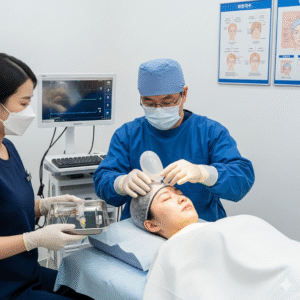Overview
Anterior uveitis is the inflammation of the middle layer of the eye, specifically affecting the front (anterior) portion of the uvea, which includes the iris and adjacent tissue. This condition is the most common form of uveitis and can cause redness, pain, light sensitivity, and blurred vision. If untreated, it can lead to serious complications, including glaucoma, cataracts, or vision loss.
What is Anterior Uveitis?
Anterior uveitis is an inflammatory condition that affects the anterior segment of the uvea—particularly the iris (iritis) or both the iris and ciliary body (iridocyclitis). It may be caused by infections, autoimmune disorders, trauma, or it may be idiopathic (with no identifiable cause). Anterior uveitis can occur in one or both eyes and may be acute or chronic.
This condition is considered an ocular emergency and often requires prompt medical treatment to prevent permanent damage to the eye.
Symptoms
- Eye redness (especially around the iris)
- Eye pain or aching
- Sensitivity to light (photophobia)
- Blurred vision
- Small or irregular-shaped pupil
- Excess tearing
- Decreased visual acuity
- Headache (sometimes associated with eye pain)
Causes
Anterior uveitis can result from a variety of underlying factors, including:
- Autoimmune diseases (e.g., ankylosing spondylitis, sarcoidosis, rheumatoid arthritis)
- Infections (e.g., herpes simplex virus, tuberculosis, syphilis)
- Trauma or eye injury
- Post-surgical inflammation
- HLA-B27 genetic marker (linked with autoimmune conditions)
- Idiopathic (in up to 50% of cases, no clear cause is found)
Risk Factors
- Individuals with autoimmune diseases
- Those carrying the HLA-B27 gene
- History of eye trauma or surgeries
- Certain infections (e.g., shingles, HIV, toxoplasmosis)
- Smoking (linked with chronic uveitis)
- Age group 20–50 (most common age range affected)
Complications
- Glaucoma (increased intraocular pressure)
- Cataracts (clouding of the lens)
- Macular edema (swelling of the retina)
- Posterior synechiae (iris sticking to the lens)
- Vision loss or blindness (if left untreated)
- Recurrence of inflammation (especially in autoimmune-linked cases)
Prevention
While not all cases can be prevented, the following steps may reduce risk:
- Manage underlying autoimmune or systemic diseases
- Practice good hygiene to prevent eye infections
- Avoid eye trauma and wear protective eyewear when needed
- Stop smoking to reduce uveitis recurrence risk
- Routine eye exams to detect early signs in high-risk individuals
Treatment Options in Korea
South Korea offers advanced and multi-disciplinary approaches to managing anterior uveitis. Eye hospitals and specialized ophthalmology centers provide expert care with cutting-edge diagnostics and personalized treatment plans.
1. Medical Evaluation
- Comprehensive eye examination with slit-lamp
- Intraocular pressure monitoring
- Blood tests and imaging for systemic disease identification
- HLA-B27 testing (for autoimmune link)
2. Medications
- Corticosteroid eye drops to reduce inflammation (mainstay treatment)
- Cycloplegic drops to relieve pain and prevent synechiae
- Oral corticosteroids or immunosuppressants (for severe or systemic cases)
- Antiviral or antibiotic agents if infection is the cause
3. Monitoring & Follow-Up
- Frequent check-ups to monitor treatment response and adjust dosage
- Regular pressure checks to prevent steroid-induced glaucoma
4. Advanced Care
- Biologic therapy in refractory autoimmune cases (e.g., adalimumab)
- Collaboration with rheumatologists or infectious disease specialists for systemic management
5. Surgical Options (if complications arise)
- Cataract surgery
- Glaucoma management surgery
- Vitrectomy (in rare severe recurrent or chronic cases)













